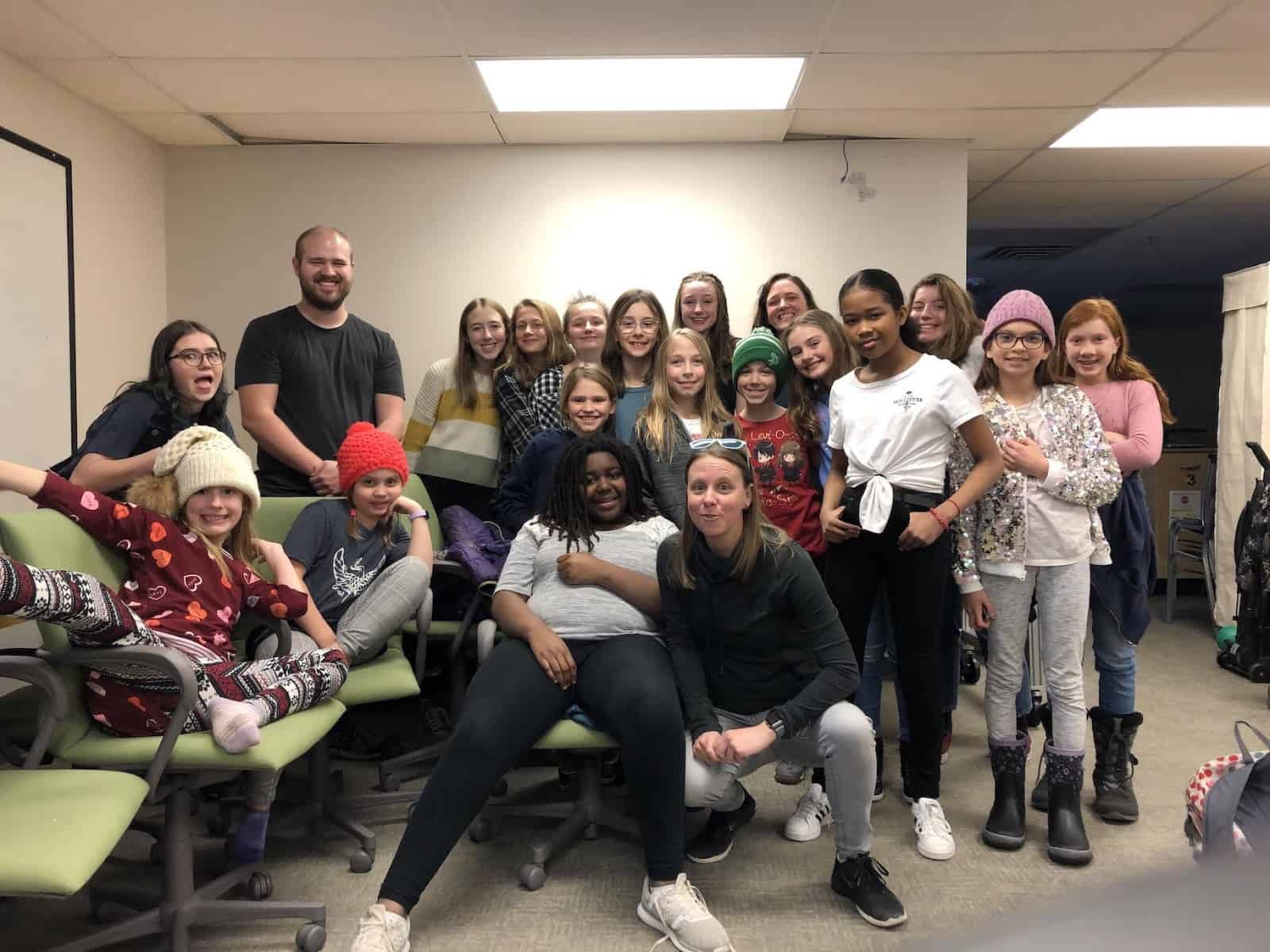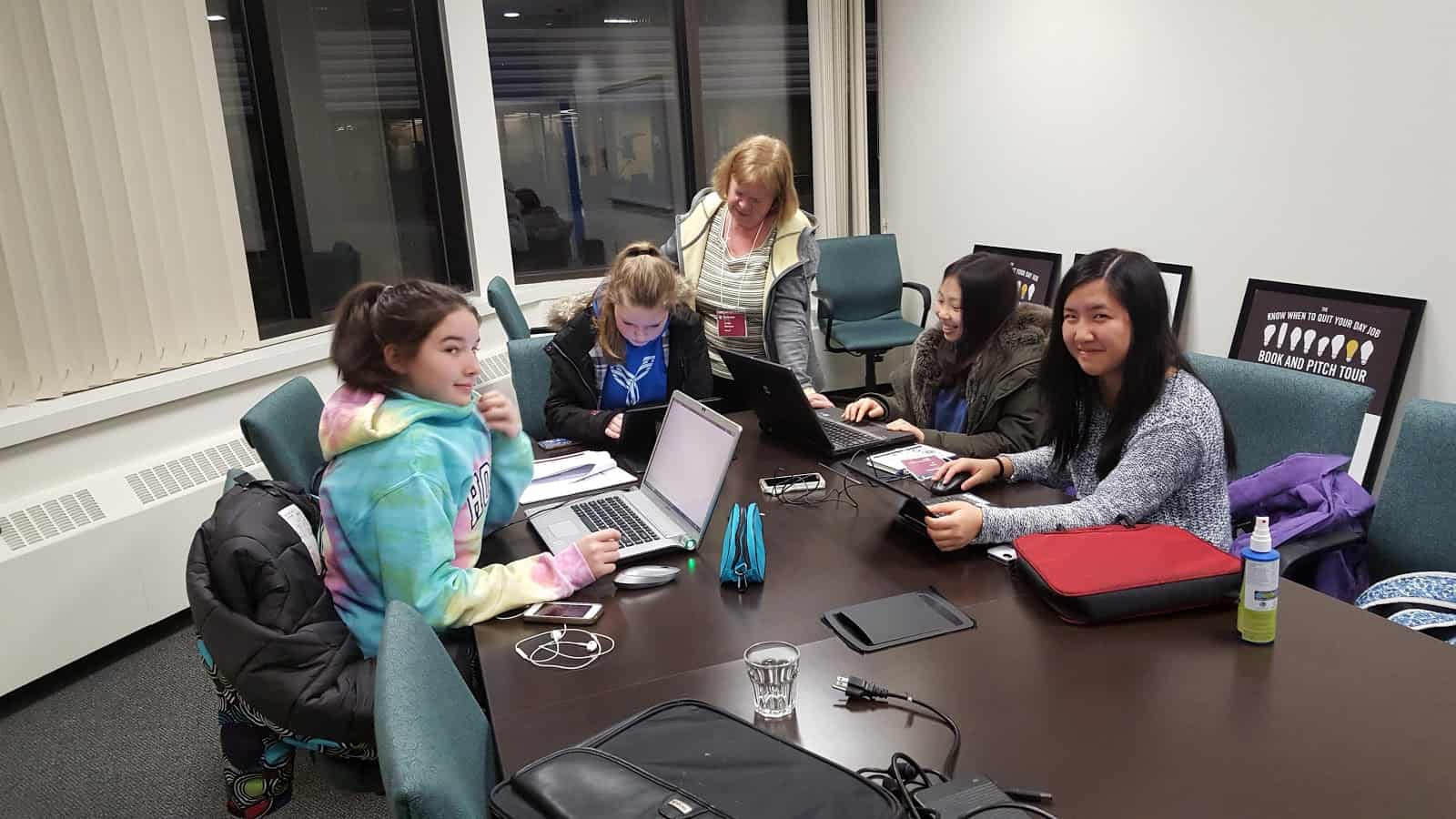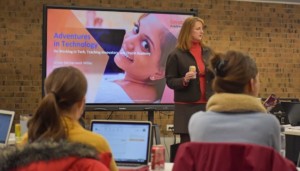Can Peer Mentoring Solve the STEM Gender Gap?

Two Mentors on Supporting Girls Who Are Changing the World
By: Devin Dillon
In the past decade there has been a net decrease in the number of young women pursuing computer science (CS). Despite significant coding education investments across the public and private sectors to help girls develop a sustained interest in CS, the gender gap in tech remains. The “leaky pipeline” problem—that is, when people lose interest in a subject they’ve been pursuing—has been well-documented, and the root of that struggle is the subject of much debate. Technology has become a key economic driver around the world, so if we want to build a more representative and equitable tech workforce of the future, we must keep working to find effective solutions to the problem.
Through my work with global technology education nonprofit Technovation, I have seen the power of a community-based approach to teaching CS that centers around real-world problem-solving instead of coding. One of the most valuable elements of that approach is our adult mentors—volunteers from a wide range of backgrounds who guide teams of girls through our 12-week technology entrepreneurship curriculum.
In honor of “Introduce a Girl to Engineering” Day, I recently sat down with two of our most prolific mentors to discuss what they have learned from their mentees, and their thoughts on what we’ll need to do to prepare girls for the tech-powered future of work.
Meet the Mentors
Kate Indrelie, a former high school English teacher and education technology consultant from Minnesota, has been a Technovation Girls mentor since 2014. Over the last six years, she has mentored nearly 125 girls on 30 teams.

Janice Sherman, a retired business professional in the IT field from Toronto, Canada, has been both a mentor and an international judge for the program since 2015. She has mentored more than 50 students during her tenure.

You Can’t Be What You Can’t See
Access to role models is often cited as a major factor in how girls view their career prospects. If they don’t see reflections of themselves in leadership, they are less likely to believe they can reach those positions themselves.
For Indrelie, Technovation’s problem-solving focus helps open girls up to a wider range of possibilities. “They’re experiencing ‘real world’ work alongside adults and that allows them to see realistic pathways toward all kinds of futures,” she says. “They can picture themselves in CS or entrepreneurial career paths—or college or high school courses—because they’ve had the support and felt empowered and successful (and had fun)!”
Sherman echoes that experience, noting that her mentees have explored opportunities for students at local companies in Ottawa. “[Mentorship] definitely impacts their career decisions going forward and gives them a lot of confidence,” she says.
While some members of Indrelie’s teams had initial exposure to technology, the school where she mentors doesn’t incorporate much tech education into the classroom curriculum. “There have been students who had only used a keyboard a handful of times, let alone done anything like coding,” she explains. “For those kids, it’s great to see how empowered they feel in learning how to research, code, and make a video and presentation, and they get so excited for what other things they can learn and create.”
While technical skills can open doors for students down the line, having a mentor who can open a window into the future can be even more impactful for a girl’s path.
Breaking Down Problems and Generational Barriers
Technology is evolving so quickly that it’s not just kids who have to keep up. At Technovation, adults from both technical and non-technical backgrounds must also learn new skills alongside their mentees, creating an environment that encourages lifelong learning. “In general, the students of today are very capable technically,” says Sherman. Though she first learned to code in college, she found the students “pick up the coding faster and know how to create videos better than I do.”
“I think it’s good advice to just be honest with the students,” says Indrelie. “When I don’t know something, I look it up, or I reach out for help, and the kids get to witness that.”
Mentoring can also help to break down barriers by showing students that adults are human, and don’t know the answer to every problem. “Technovation is great because the kids see that problems are messy and don’t necessarily have a single solution, and probably most importantly, their mentors are just like they are—using resources at their disposal to search for solutions that they don’t know (or maybe can’t know) outright,” says Indrelie.
Skills Beyond Coding
Coding education has exploded in the last 10 years, but teaching coding in a vacuum has not moved the needle on diversifying the technology workforce. Mentors who have experience in non-technical fields, like Indrelie and Sherman, help girls develop broader skill sets that will support the students throughout their academic and professional lives.
“I would encourage anyone who has business experience to consider mentoring,” says Sherman. “I find that this is one of the areas where the girls need the most help. Project planning, decision making, and time management are some of the most important skills we can help them develop.”
Management skills are also a focal point for Indrelie. “I consider a lot of the work I do with teams to be project management: helping them understand the tasks at hand and chunking it into achievable goals and supporting them along the way,” she says. These management skills set the foundation for the entrepreneurial aspects of their Technovation projects. Indrelie coaches her mentees on crucial, non-technical skills that will set them up for success. “Helping teams ideate, research, make a business plan, and work on presentation skills are a huge part of a mentor’s role in the program,” she says.
Effective teamwork—particularly in a diverse environment—is a skill that Indrelie emphasizes. “It’s very important to help students understand their strengths and challenges within a team setting while encouraging them to value inclusivity, diversity, and cultural understanding,” she says. “If this generation is solving the problems of tomorrow (and today), they need to understand the context of the diversity of the world around them, and the ways in which that diversity will help their work.”
Giving Back and Learning Something New
While students gain some of the biggest benefits of mentor relationships, Indrelie and Sherman have also been impacted by their mentees in major ways.
“Year after year I am astounded by the enthusiasm, passion, and creativity of the girls,” says Indrelie. “I always seem to go into a season with this expectation of seeing the same couple of problems and app ideas, and every year groups come up with something incredible I never would have thought of. They feel so deeply about the problems they’re tackling with their apps, and it’s a gift to work each week with girls so intent on and so convinced that they have the power to change the world.”
Both Indrelie and Sherman feel that mentoring is a great way for adults to learn something new while giving back to their communities.
For Sherman, the opportunity to share her knowledge has created a sense of purpose during her retirement. “I feel that I am making a contribution to society in a small way and it is based on what I have learned throughout my career,” she says. “I have also learned a lot more about today’s tech field and mobile apps than I would have learned otherwise.”
“Technovation, through the support of the curriculum and the local chapters, makes it super easy to get involved regardless of technical expertise,” says Indrelie. “I’ve been doing this for seven years and sometimes still feel in the dark regarding a lot of the coding parts of the experience, but with the help of other mentors and the curriculum, I feel empowered to help all the teams.”
Supporting the Next Generation of Problem-Solvers
Between climate change, mental health, inequality, and more, we face urgent and systemic problems on all fronts. Mentors like Indrelie and Sherman show us that there’s more we can do about it than feel anxious—there is room for adults from all walks of life to support the next generation of female leaders tackling these issues. Join them and get involved.
For more, see:
- Girls Who Code: Connecting GenDIY Women to STEM
- Black Girls CODE Building Tech Exploration Lab in New York
- 2019 Coding and Computer Science Resources
Stay in-the-know with innovations in learning by signing up for the weekly Smart Update.
Devin Dillon is Senior Program Director at global technology education nonprofit Technovation (@Technovation), where she leads the Technovation Girls and Families programs that have empowered more than 130,000 participants (especially girls and mothers) across 100+ countries to tackle problems in their communities using AI and mobile app coding technologies. Devin has a Master’s of Science in Education from Johns Hopkins University, where she specialized in working with students who have learning disabilities.





0 Comments
Leave a Comment
Your email address will not be published. All fields are required.